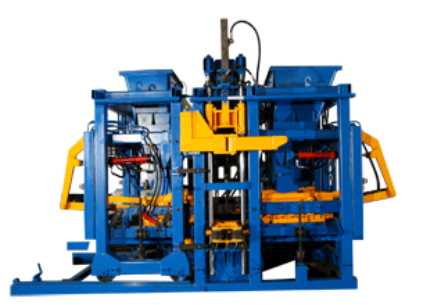Automation significantly impacts the operation and efficiency of concrete block making machines in several ways:
- Consistency and Precision: Automated systems ensure consistent quality and precise measurements in block production. They control parameters such as material proportions, compaction, and shaping, resulting in uniformity across all produced blocks.
- Increased Speed and Productivity: Automation enables these machines to operate continuously and efficiently. They can produce blocks at a much faster rate compared to manual methods, significantly increasing overall productivity.
- Reduced Labor Dependency: Automation reduces reliance on manual labor. Machines handle various tasks, minimizing human intervention in repetitive or physically demanding activities, leading to cost savings and improved safety.
- Optimized Material Usage: Automated systems precisely measure and control raw material usage, minimizing waste and optimizing material consumption. This efficiency reduces costs and minimizes environmental impact.
- Quick Changeovers and Flexibility: Some machines allow for rapid mold changes or adjustments, enabling swift transitions between different block sizes, shapes, or designs. This flexibility minimizes downtime and boosts operational efficiency.
- Integrated Quality Control: Automation includes in-line quality control mechanisms that inspect produced blocks in real-time. Defective products can be identified and removed automatically, ensuring a higher percentage of usable output.
- Data Monitoring and Analysis: Automated systems collect and analyze production data in real-time. This information helps identify inefficiencies, bottlenecks, and areas for improvement, allowing for continuous process enhancement.
- Remote Monitoring and Control: Advanced automation allows for remote monitoring and control of machines. Operators can oversee operations from a distance, address issues promptly, and make real-time adjustments, minimizing downtime.
- Energy Efficiency: Modern automated machines are designed to operate efficiently, consuming minimal energy while maintaining high productivity. Energy-efficient systems contribute to reduced operational costs and environmental impact.
- Consistency in Maintenance: Automated systems may have built-in maintenance alerts or predictive maintenance features. These systems detect issues early, allowing for proactive maintenance scheduling, ensuring continuous machine operation.
Overall, automation in concrete block making machines streamlines processes, improves accuracy, enhances productivity, reduces labor costs, and contributes to higher-quality block production. It transforms the manufacturing process, making it more efficient, reliable, and adaptable to various production needs.
How do concrete block making machines adapt to different raw materials or compositions used in block production?
Concrete block making machines exhibit adaptability to various raw materials or compositions used in block production through several mechanisms:
- Mixing and Batching Control: These machines often feature flexible mixing and batching systems that can accommodate different ratios and compositions of raw materials. This adaptability allows for the production of blocks using varying aggregates, cement types, or additives.
- Adjustable Compaction and Vibration: Machines can be adjusted to control the compaction forces and vibration frequencies during block formation. This adaptability ensures proper compaction of different raw materials without compromising structural integrity.
- Customizable Molds: Many machines incorporate interchangeable or adjustable molds that can be customized to produce blocks of various sizes, shapes, and designs. This flexibility allows for adaptation to different raw material compositions.
- Material Feeding Mechanisms: Block making machines can have adaptable material feeding mechanisms that cater to different consistencies and compositions of raw materials. This flexibility ensures efficient handling and processing of diverse materials.
- Temperature and Curing Control: Advanced machines include control systems for the curing environment, including temperature and moisture levels. concrete blocks making machine This adaptability allows for optimal curing conditions that suit different raw material compositions.
- Compatibility with Additives or Reinforcements: Certain block making machines are designed to handle additional additives or reinforcements within the block composition. This adaptability enables the production of specialized blocks with enhanced properties.
- Variable Programming and Controls: Modern machines may feature programmable control systems that allow operators to adjust parameters such as mixing times, compression forces, vibration frequencies, and material flow rates. This adaptability optimizes production based on specific raw materials used.
- Material Testing and Calibration: Some machinery includes systems for testing raw materials before production, ensuring their compatibility and quality. This data might be used to calibrate the machinery for optimal performance with varying materials.
These adaptable features in concrete block making machines allow for flexibility in accommodating different raw materials or compositions. By adjusting parameters and configurations, these machines can optimize the production process, ensuring consistent quality and performance of blocks regardless of the material variations used.
